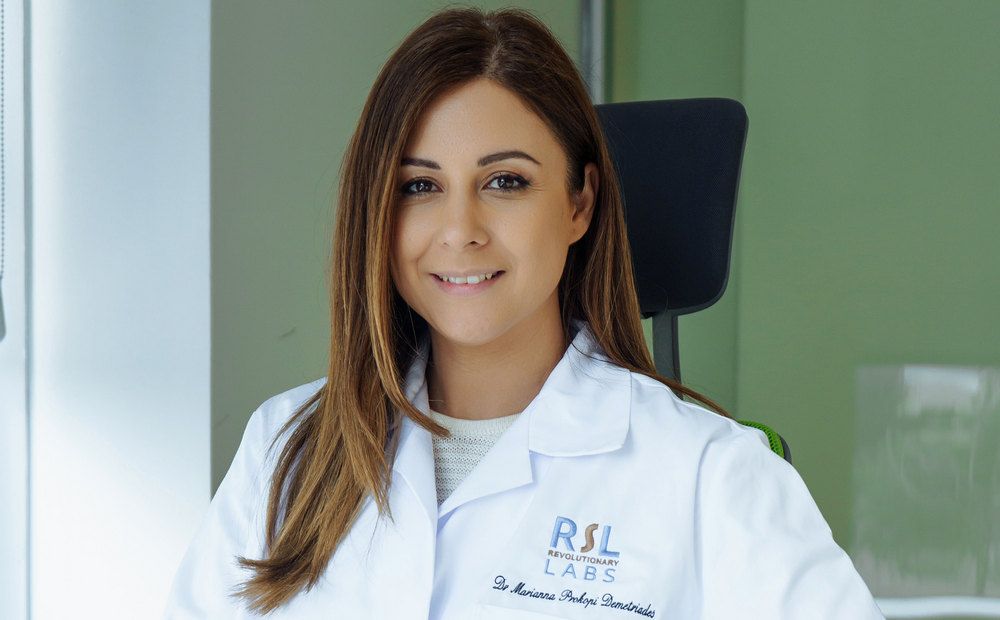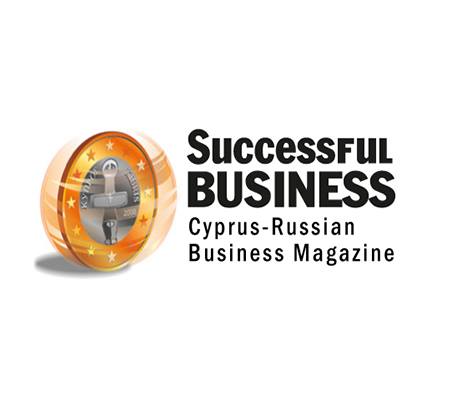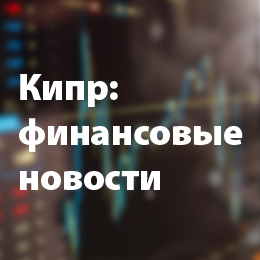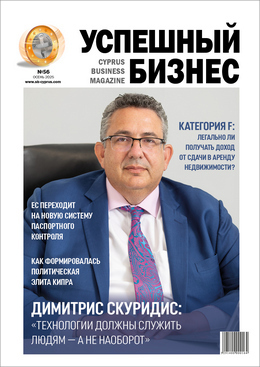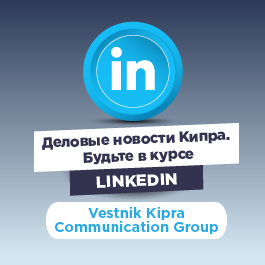The editors of Successful Business spoke with Dr Marianna Prokopi-Demetriades, a molecular biologist and co-founder of several biotech companies, about the peculiarities of startups, ambitious goals, amazing opportunities and life values.
There are so many startups in health, beauty and biological research field that fail. What makes a startup grow and succeed?
Startups are emerging companies with small but very agile and brilliant structures. They are designed to grow fast and are born out of a desire to solve a problem, fulfill a demand, and bring a unique product in the market that would make a great impact. Startups in the biotech field are very innovative in the early-stages, designed for breaking new grounds to improve our lives. However, the biotech startup ecosystem is quite unique. It requires a lot of capital, and it has a longer development process to allow for testing, prototyping, in vitro-in vivo, ex vivo validation, and for clinical trials, before even going into the market. Early-stage biotech startups have no customers for quite some time, therefore, there is a need for greater investment either in the form of scientific grants from the government, the European Union, or through accelerator programs, angel investors or at a later stage from venture capital funds.
Biotech startups fail for a variety of reasons including lack of capital, inexperienced leadership, slow product or clinical development, undefined market need, failure to adapt in the market etc. Good science doesn’t always guarantee success! You need an amazing team in place. People that share the same passion and vision and of course, persistence. That's why we are partners with Costas Pitsillides. We started this journey together, and hopefully, we will achieve our goals together. The success of Biotech entrepreneurship relies purely on teamwork, and not on individual contributors! For me, the most important aspect is knowing your co-founders.
What makes scientific research so expensive to invest in?
Biotech research is costly and often takes several years to develop a product. It also depends on the field of your work. For example, if you are in the cancer research field and try to develop a therapeutic device or a drug, you have to start from the very beginning by demonstrating your idea in an in vitro setting (including cancer cell testing, DNA-, RNA-, protein analysis etc.). The next phase involves testing in a preclinical small animal model setting for validation of drug specificity, efficacy, pharmacokinetics & toxicokinetics and possible side effects.
This is a very expensive and lengthy process, and it takes a lot of expertise and teamwork. Our team members are highly educated, with specialized scientific expertise at the level of Masters, Ph.D.’s and Postdocs. While biotech advancements promise to transform health, this type of business is risky and costly, but if you succeed, it can also have a huge impact on society and the market alike.
What is the state of Biological Sciences in Cyprus?
We have excellent research teams in both private and state universities, as well as in research institutes with team leaders coming from world-renowned Universities such as Harvard, Cambridge, Oxford etc.The Cyprus biotech ecosystem implements biomolecular and cellular processes for the creation of a variety of healthcare, food, and fuel products for instance. We have teams working in the oncology field either on diagnostic, therapeutic or mechanistic approaches. We also have strong cardiovascular expertise and a focus on thalassemia, a blood disorder that is a great worry for Cypriots.
Biotech is undergoing a global evolution. The most notable innovations in biotech involve personalized medicine, drug research, artificial intelligence, big data, and synthetic biology. Biotech entrepreneurship in Cyprus evolves slowly but steadily with few people taking their research into the next level, from the lab to the market. In Cyprus for many years, we lacked the entrepreneurial culture or passion that you could find for example, in the US City of Boston and in Israel, for the past 5 years, you can see great expansion in the Biotechnology startup ecosystem with some great success stories although not many in numbers.
What support do entrepreneurs need to move forward and where do they get it?
Thankfully, things have changed since the time we started this venture with Costas. Today, entrepreneurs have access to accelerators, incubators, and there are companies that can help you in those early stages. One such company is Kinisis Ventures, who has helped us by accelerating our entrance into the market by opening up networks and connections, especially with the US. There are other accelerators like IDEA, Cyprus Seeds, ARIS, that is backed up by Deloitte, and Bank of Cyprus, Junior Achievement Cyprus etc. Now some universities have their own accelerators, like the University of Cyprus.
Hopefully, with new VC funds currently entering the Cypriot market, we will see an expansion of entrepreneurial activity in our industry. It is also important to note the work done by the Deputy Ministry of Research, Innovation and Digital Policy, the Research and Innovation Foundation together with the European Union who created programs connecting academia with industry, as well as their work in promoting the creation of new startups.
However, one major problem that we found is that there is a void following the first step of launching a startup. One big question to ask yourselves once your business is up and running, is how do you grow and enter the next level? Operating and maintaining a startup is a huge problem. It needs access to funds – funds from the US, the EU and other investors. Currently, there is no developed network that will give you the access or help to enter the market. By working with other state stakeholders and private establishments I am sure we can create a strong and viable ecosystem here in Cyprus, as there is a lot of talent, passion and desire for innovation and it would be a great shame not to support the local growth in this industry.
What backup would you expect?
As I mentioned earlier, after the initial support to startups in the early stages from the Deputy Ministry of Research, Innovation and Digital Policy there is a void. With no investment at this point, most startups end up in the “valley of death”, as we call it. Getting to the second phase requires access to funds. Which is why we are trying to promote Cyprus abroad. Cyprus is more than a tourist destination and an island of good service providers. The island also has innovators. We have young people with amazing ideas and innovative products.
How did you become a scientist?
Science has fascinated me from a young age. I remember being 9 years old and asking my father for a microscope as a Christmas present. There was always a love for biology and I had an interest in astronomy as well. Actually, I have two telescopes in my house. I always had a passion for the microcosmos and macrocosmos.
Then at school, I had an amazing teacher, who was a scientist. She was an astronomer, teaching us physics and biology.I experienced first-hand how a woman can also become a scientist - a very successful one, whilst also bringing up children in a happy family environment. I was so inspired by her success story!
While on my PhD studies, I also had access to another brilliant mind - Sir James Black (Nobel Laureate). He embedded in my mind the thought that the ideas and the theories that you might have in the lab can become products for the greater good of the community. I believe I inherited the entrepreneurial spirit from Sir James.
My professional path started in the “classic” manner. I did a Bachelor's degree in Molecular and Cellular Biology, a Master's in Biochemistry, a second Master's in Molecular Virology and Bacteriology, a PhD on Cardiovascular stem cell research at King’s College London and a Postdoc in Oncology and nanotherapeutics. When I came to Cyprus, I worked in the Pharmaceutical Industry for a short period of time, and then, I moved into academia at the Cyprus University of Technology and European University of Cyprus, while I had experience in the clinic environment both at the Bank of Cyprus Oncology Centre and the German Oncology Centre. My path then pivoted from its classic manner when I met with Costas Pitsillides, and we decided to open our first company.
What was the idea behind the company? Why did you create it?
We started with a big dream - to find a cure for cancer! At the time, I had just lost my sister to cancer, and I had lost my father to cancer a few years earlier. Cancer became a big and very sad part of my life.
Once you see your loved ones suffering, see their quality of life deteriorating and the therapies that are currently in use, it is very easy to spot a huge void. We wanted to create a therapy that doesn’t kill the person and is also personalized, targeted and effective.
So, we created a very advanced technology based on extracellular vesicles, deriving from mesenchymal stem cells, which can selectively target tumor sites and deliver their therapeutic payload directly to cancer cells. These targeted delivery vehicles can be loaded with specific miRNAs that can regulate multiple oncoproteins, potentially allowing the inhibition of multiple cancer pathways with a single approach. Thus, our approach offers significant advantages in terms of tumor selectivity and efficacy compared to current treatments and can potentially provide a new avenue to successfully treat a wide range of cancers.
How do you personalize the therapy?
We have a platform technology based on microRNAs (miRNAs), a class of small non-coding RNAs that can regulate multiple genes and pathways associated with cancer growth and metastasis. The company has developed a panel of miRNAs, both biological and synthetic, which can affect the function and disrupt expression of an expanding list of oncoproteins that are dysregulated in most cancer types. We can modify the therapy based on the molecular profile of the patient enabling us to provide customization and personalization of cancer treatment. Nowadays, the cell therapeutics are in every clinic in the advanced world. They can custom made an immunotherapy for you. This will become common practice in every hospital in the next few years and it will be available to everyone.
We have started the process by planning to license the technology and make it accessible to hospitals through specialized strategic partners.
How dangerous is this therapy?
Our platform has reached successfully the preclinical stage without any adverse side effects or toxicity issues. However, the pathway to market it is long and involves further development and regulatory approval before bringing a drug to the market. There are numerous regulations that apply to the biotech industry, and we must follow the bioethics and the regulations from the FDA or the EMA.
A very nice example of advanced cell therapeutics offered in some clinics is the CAR T-cell therapy, a very complex and specialist treatment based on immunotherapy. With this treatment, a specialist collects and makes a small change to your T cells. After a few weeks, you have a drip containing these cells back into your bloodstream. The CAR T-cells then recognise and attack the cancer cells. It is available as a possible treatment for some children with leukemia and some adults with lymphoma. People with other types of cancer might have it as part of a clinical trial.
If your company is acquired by a big business, what would you do and how would you feel about it?
Every case is different, there are very interesting debates whether it’s better to in-license an asset or acquire the whole company. It depends on the agreement. In the biotech field, you have to know where you stand. We have the expertise to do the development stage, but we don't have the expertise and the dynamics to move into clinical trials. However, the strong sellers' market for outstanding technologies has put biotech firms in a better negotiating position than ever before. Pharmaceutical companies are willing to pay higher prices for licenses and are also assuming more risk and accepting less outright control of the product, that resembles licensing between equals.
Most of the times, both parties are working in parallel to co-develop and co-market to succeed. All you need to decide is to choose a strategic partner that shares the vision and truly believes in the technology. If you want your medicine to be successful and to save lives, you have to follow an appropriate pathway. It's not a matter of losing money or losing control, it's a matter of finding the best way to bring this into the clinic. You are trying to save people, and that's what matters.
You have three main projects; one is about cancer. What is the second project about?
The second is about collagen biomaterials for improving the quality of life. We're working on highly purified collagen formations that can work as a bionic for 3D printing of artificial organs; as a material for regeneration medicines and as material for wound healing, traumas and burns. It's a material that is going to be in our everyday life in the future and it will improve the quality of patients’ lives.
We are already supplying the collagen market with collagen used in research and development. Our products are available in the US market as well and are listed on major catalogues such as Thermo Fisher Scientific Inc. We are also working on customized solutions for the collagen that goes into clinical practice. We collaborate with companies that want quality collagen for bioprinting for specific organs like nerves or lymphatics.
At the same time, we are developing a new formation of collagen, that will go into the pharmaceuticals for either protecting wounds or healing wounds. Promed is a B2B company working on specialized solutions for the regenerative medicine market.
What is your third project?
The third project started as a very small project. Before losing my sister, Magda, to cancer, we spent a lot of time together after her therapy sessions. She had a lot of skin problems after radiotherapy and chemotherapy, and we tried to find appropriate products in the market to help her skin feel better, and sadly we couldn't find any. I created this company in her memory!
We tried to make a line of products that works on either the healing or the conditioning of the skin of oncology patients, as skin toxicities are major side effects of chemotherapy and immunotherapy. The line is already developed and approved by the pharmaceutical services of Cyprus and the European Union and will enter the Cypriot market in May and Greek and Austrian market by the end of the year.
In collaboration with all the three companies, we are also finalizing a very exciting project, a medical device for wound healing. We have entered clinical trials in Cyprus and Greece and by the end of the year, once the clinical data results are collected, we will file for a medical device approval by the regulatory authorities.
What does RSL mean?
RSL stands for Revolutionary Skin Labs, the name of the brand is εὖSKIN®. In Greek εὖ means good, pure. So, we wanted to create a pure line that cares about the quality of life and is dedicated to skin. Personally, I feel it’s important to have a Greek part in it. Once you have an international presence, you want to keep the Greek element prominent. It is important to show that a company based in Cyprus can enter the international market. Of course, it would be easier and more cost effective to manufacture our product abroad, however, we really wanted to create a new industry in Cyprus for the next generation and continue the legacy.
Anything that is important to you that you would like to share with our readers?
Even though monetary success and having a “good life” is very popular, I think what matters most is being authentic and leaving your mark in the world.
I want to leave something good in this world – hopefully a cure, better quality of life for the patients, and a better workplace environment for my coworkers. Work is a big part of my daily life, and it is important for me to make sure that we provide a comfortable environment for everyone to generate and create new ideas.
I lost my mother when I was very young, and I missed coming home to a warm place and a truly happy environment. Family is very important to me and my two beautiful children, aged eight and ten years old, mean the world to me.
It’s difficult to find the balance between work and family. That's why I try not to work over the weekends, because it's the only two days where we can all spend quality time together. As my children are growing, they are starting to realize the importance of my job and they are so proud of me, hence spending as much time together as possible, is vital. Although during the weekdays, I do not spend a lot of time with them, I always ensure when I come home, to read a story together, talk about our lives and share my work with them. Over the weekend, I become a ‘supermom’ and dedicate a lot of my time to my children.
It is also important, to take the time in our busy lives, to appreciate the environment and in particular the nature around us. We live in a beautiful country - I wasn’t born in Cyprus; I was born in Greece and although it is a foreign country, Cyprus is my home now. What I love is taking long walks at the beach, which is located only a 5-minute walk from home or I can drive 30 minutes to Troodos mountains and just breath the fresh air.
Marianna Prokopi-Demetriades is Molecular Biologist with expertise in stem cell technologies, cancer biology, and nanotherapeutics. She studied molecular & cellular biology, biochemistry, and proteomics (University of London, King’s College London). Marianna is skilled in Cancer nanotherapeutics, personalised gene therapies, regenerative medicine, cardiovascular proteomics, Life Sciences, Genetics, and Cell Biology. She holds a PhD in Cardiovascular Medical Research. She is the co-founder of three biotech companies. RSL Revolutionary Labs Ltd develops innovative dermaceuticals for the relief and healing of skin side effects in oncological patients; Promed Bioscience Ltd develops medical biomaterials with 3D-atelocollagen for medical applications, synthesis of 3D-artificial organs and tissues; Theramir Ltd develops new generation personalized therapies and diagnostic platforms for cancer based on nanotechnology and microRNAs.
